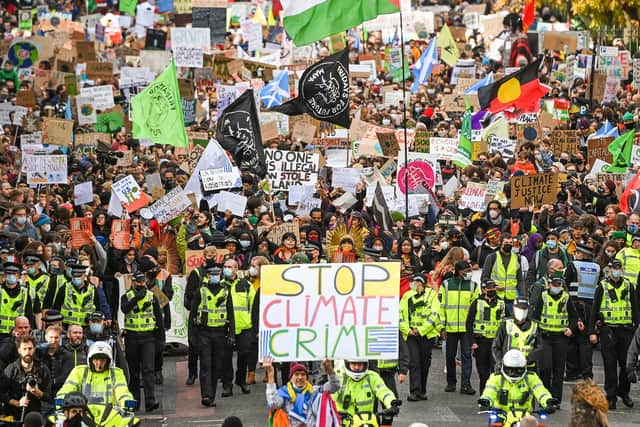COP26: If world leaders fail to 'keep 1.5C alive', market forces could yet save the day – Scotsman comment
The talk was of trying to reach agreements that would “keep 1.5 alive”, based on scientists’ assessments that going beyond that figure could result in irreversible changes to the earth’s climate, such as long-term, sea-level rise.
India’s announcement that it would work towards achieving net-zero carbon emissions by 2070 – ten years later than China currently plans and 20 years later that the 2050 target scientists say is required – displayed a lack of ambition and appeared to make the mistake of thinking that delaying the transition to net-zero will be good for the economy.
Advertisement
Hide AdAdvertisement
Hide AdSimilarly, Australia’s refusal to commit to the phasing out of coal demonstrated a Luddite longing to preserve the technologies of the past.
However, there have been signs of progress.
Nearly 100 countries – collectively home to 85 per cent of the planet’s forests – have pledged to end deforestation by 2030. Trees are a natural carbon-sequestration machine and if the world’s forests grow bigger, this will help remove carbon dioxide from the atmosphere. And almost 100 countries also agreed to cut emissions of methane – a powerful greenhouse gas – by 30 per cent by 2030.
But, right now, it looks unlikely that the world will indeed commit to “keep 1.5 alive”, unless there is an unexpected breakthrough next week.


As others have pointed out, the departure of most world leaders in the first week – previously they have arrived at the end of the talks to help get agreements over the line – suggests there will not be any major surprises.
However, while world leaders play a highly important role, they do not actually play the decisive one.
Major international corporations are increasingly working to cut their emissions, driven in part by consumer demand and by their recognition that zero-carbon is the future.
Companies and countries that inexplicably fail to see this will in the end be left behind as the rest of the world enters a new Industrial Age.
So if our leaders fail, it is possible that people power – as expressed through market forces – could still come to the rescue.
A message from the Editor:
Thank you for reading this article. We're more reliant on your support than ever as the shift in consumer habits brought about by coronavirus impacts our advertisers.
If you haven't already, please consider supporting our trusted, fact-checked journalism by taking out a digital subscription.
Comments
Want to join the conversation? Please or to comment on this article.
